Again, it turns out that a hundred years ago, Poles were much less prudish than today. As soon as the Republic of Poland regained independence, official sex lessons were introduced in schools. Although it must be honestly added that their content is creepy. Maybe even nausea.
From the end of the 19th century, Polish educators called for the introduction of sex education to schools. They considered it of the utmost importance. According to surveys around 1900, most boys started having sex while they were still kids. 15% - even before their fourteenth birthday! Importantly, they did it without any security and without thinking only fueling the already dreadful scourge of STDs and illegal abortions.
“This work must and should be included in the educational plan both by the school and the family home. (...) But maybe above all the school, wrote the progressive pedagogue Teodora Męczkowska. Initially, similar postulates met with wide approval. They were allowed even in church settings - though not without reservations, of course.
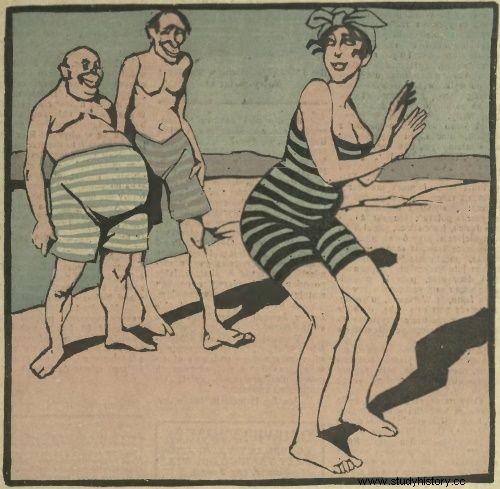
Poles from a century ago definitely lacked good manners in erotic matters ... (illustration from the magazine "Sowizdrzał", 1919).
Questions were asked about who, how and when should educate. Despite the emerging doubts, the first sex education lesson in Poland was conducted before 1904. It was attended by students of the Merchants' Assembly Trade School in Warsaw. And… that was it. At least in the opinion of most historians.
The end or just the beginning?
Resistance to the alleged "mental exhibitionism" (as public sex education was increasingly referred to) grew, and in 1929 even Pope Pius XI took the floor. He criticized "fools" who "propagate a dangerous method of education, which is called the hideous name of sex education ”.
This sentence allegedly killed Polish projects to popularize school sex lessons. And that's before any of them were implemented. A specialist in pre-war education, Robert Kotowski, even stated in a recently published book that during the entire interwar period it was impossible to define who, where and how should conduct sex lessons. This is not true. The decision, as usual in such cases, belonged to politicians and was made by the government of Wincenty Witos.

Pope Pius XI was not going to agree to "obnoxious" sex education in schools ...
Shameful Circular
A few years ago, Marek Babik from Ignatianum in Krakow came across a completely forgotten circular sent on December 10, 1920 by the Ministry of Religious Denominations and Public Education. Document number 23329 II read:
In agreement with the school management and teachers, the school doctor should spend a few hours a year in lectures on hygiene in each class. (…)
In recent classes regardless of individual treatment of the matter, [should] be considered in the most tactful way and taking into account the sensitivity and excitability of adolescents, the gender issue in biological, ethical and social terms.
Babik has no doubts:it was on this day, ninety-five years ago, that sex education in Polish schools began. It is much more difficult to say with certainty whether this was an expression of progress. The document stated the recommended textbook for sex education. A peculiar position, to say the least.
Heavily outdated manual
The department director wrote that in the course of hygiene lessons, "you can follow the appeal to male youth by prof. Herzen ("Books for All" by Arct) ”. The exact title of the book was: Address to male youth. Lecture by Dr. Alexander Herzen delivered in Lausanne and Geneva. It wasn't even a textbook, but a kind of short talk for young people.
It was delivered by an undoubted medical authority, but in the field of neurophysiology, not sexology. Moreover, the authority of the previous epoch.
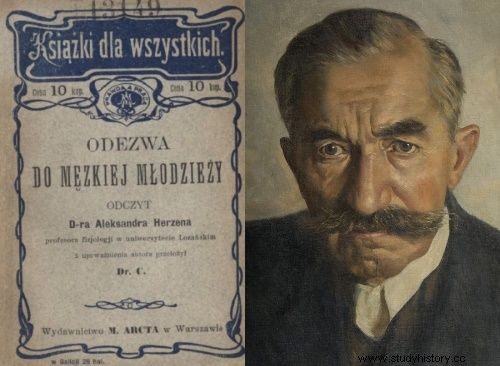
The government of Wincenty Witos (on the right), however, preceded the Holy Father. Already in 1920, he introduced official sex education lessons, and also - the first sex textbook in Polish schools.
Herzen's reading was written at the turn of the century, and was published in Polish in 1904. As for the conditions of the beginning of the 20th century, it was quite a modern text, but sixteen years later it must have evoked bursts of laughter from specialists reading it.
The lecture opening declaration was mainly progressive. The author announced that a "new morality" was being born and that he set himself the goal of defining its boundaries. The rest is a mix of scare, 19th century chauvinism and wishful thinking.
The deadly stigma of syphilis
Herzen spent a good half of his conversation about the effects of the syphilis infection. He described in detail the disgusting symptoms of the disease, focused on its heredity, did everything to disgust the recipients by having sex with random partners or even sex in general.
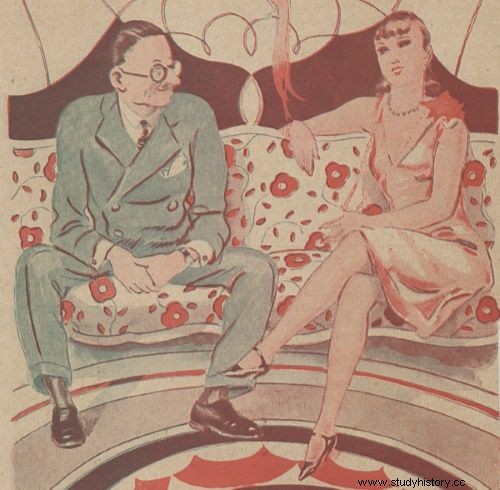
Herzen's textbook recommended that until the age of 22 be limited only to looking at yourself ... (Illustration from the pre-war magazine "Free Thought, Free Jokes". Reproduction made available by the Digital Library of the University of Lodz).
In 1904, it seemed perfectly understandable to focus so much on the risks - and mostly venereal diseases, not pregnancy. But a decade later, the first effective syphilis drug, salvarsan, was already in common use. It has become a simple lie to keep telling students that syphilis is always a deadly, indelible stigma.
The animal is looking for a random female
Herzen urged, in keeping with the spirit of the age, to stop using sex solely as a tool to satisfy the drive. He wrote:“The animal is looking for a random female… Many men do the same. But we, gentlemen, are not wild people, or at least not quite wild ... The man has a choice:either to satisfy this sex drive as any animal would, or to succumb to the voice of reason or feeling. "
It's hard to argue with the idea of "humanizing" sex. At the same time, however, the author consistently focused solely on male drives and male sexual needs. He has traditionally assumed that "women are more timid, restrained, have more innate shyness, and almost always men are a seducer" . In short, sex is not their business. And if they do deal with him, they will be as passive wives or as rape victims.
One solution:100% abstinence
Finally, Herzen warned against sexual abuse. He was of the opinion that any sexual intercourse before reaching complete sexual maturity harms the entire body and prevents "normal development". He postulated:
A man in our zone does not fully develop until between the twenties and twenty-two. Therefore should not be used by any young person prior to this time on his genitals. If he does so, he is regrettable, because he risks weakening (...), the effects of which will not be avoided and which he will bear throughout his life, not only himself, but also his offspring, and thus the whole country!
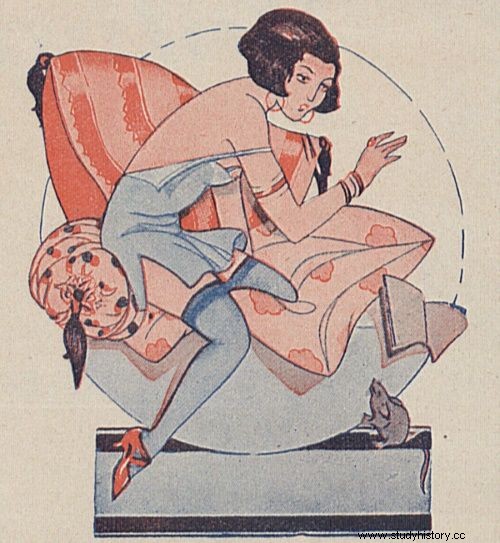
Sex education lessons were, in theory, intended for all students. Herzen's handbook, however, completely ignored women. According to the author, sex did not really concern them ... (Illustration from the pre-war magazine "Free thought, free jokes". Reproduction made available by the Digital Library of the University of Lodz).
It was typical for the turn of the century to go from extreme to extreme. Unpunished debauchery was to be replaced by one hundred percent sexual abstinence. In 1904, such a postulate could be taken seriously. Many doctors and hygienists believed in the dire consequences of "poorly done" sex. There were still followers of this theory even in the 1930s. Interestingly, especially among Soviet specialists.
Grigorij Bruk at work Towards a healthy sexual life of 1935 assured:“Sexual continence does not harm, but good. (...) A person who abstains from premature intercourse develops better both physically and mentally. "
The author had an archaic scientific explanation for this: "With a seed, a young man loses many valuable substances that are needed by numerous human organs for their proper development (...). The brain and the skeleton must suffer from this. ”
In the same year, also N.J. Safanov, author of Men and Women in Sexual Life . He postulated that every man should wait until he was twenty-five before having sex. The cobblestones were just a tad more forgiving. He considered twenty-three, twenty-four years to be the cutoff period.
None of them even in the margins indicated that there are other possible positions. Meanwhile, pragmatism came to the fore in the 1920s. Doctors began to point out that, after all, humanity did not die out, despite the "mistakes of youth" of hundreds of generations. Apparently, youthful sex wasn't that dangerous in itself.
Fear of real education?
At least a few Polish researchers could tell the children about it. For some reason, however, they were not asked for their opinion. The choice fell on an exotic, outdated, foreign brochure. And what is especially interesting - a brochure written by a Russian, because Aleksandr Herzen was of that nationality.
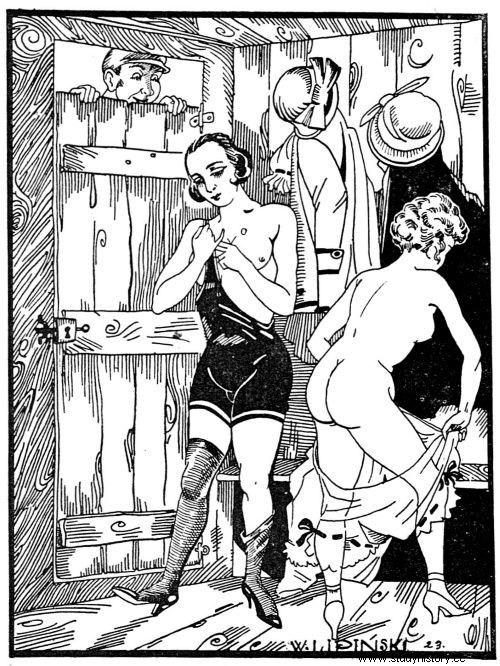
Herzen argued that nothing supports the health and development of the body as much as avoiding erotic stimuli (above illustration from the pre-war magazine "New Decameron", 1924).
Of course, this fact did not matter in substance. One must remember, however, that it was 1920, right after the war with the Bolsheviks. There was a tendency in Polish legislation to ruthlessly remove the influence of former partitioners from every area of life. When the sound films hit theaters, the authorities will even ban all productions containing German words from being shown.
If, nevertheless, the Russian's book was considered the first sex education textbook, then apparently no one thought it deeper. Later, however, in a manner typical of Polish legislation, no one returned to it. And only Michał Arct's publishing house could rub their hands.

The Ministry of Religious Denominations and Public Education (the photo shows its Warsaw building) has not decided to cross the Church for the second time.
In 1928 - a quarter of a century after the first publication - the publishing house resumed Odezwa to meet demand from schools. The title of the book has been simplified and slightly modernized. Now it was just a Appeal to the male youth. However, the text remained unchanged. The author couldn't update it even if he wanted to. He died in 1906.
Another official textbook on sex education has not been introduced. The matter, especially after the Pope's critical words, became too touchy . The new ministerial circulars regulated the issue of hygiene lessons (they were to be held even once a week), but they did not mention sex directly. In one of them it was even mentioned that students should not hand over anatomical atlases - because they will learn something that they should not know. And to some extent, this approach persists until today…
***
The above article is just a brief outline of the fascinating topic of pre-war contraception. In the first decades of the 20th century, resourcefulness went hand in hand with desperation or even madness. Pregnancy was prevented using x-rays, radium placed in the uterus, and even bull's-eye injections. At the same time, it was then that the prototype of the first effective contraceptive pill was created! You can read about all this and more in the latest book by Kamil Janicki: “The epoch of hypocrisy. Sex and erotica in pre-war Poland ” .
Bibliography:
The article was based on the literature and materials collected by the author during the work on the book The age of hypocrisy. Sex and erotica in pre-war Poland . This book was published as the first book under the brand of "Curiosities of history".
Selected bibliographic items below:
- Babik Marek, Polish concepts of sexual education in the years 1900-1939 , Higher School of Philosophy and Pedagogy "Ignatianum" / WAM Publishing House, Krakow 2010.
- Bruk Grigorij, Towards a healthy sex life. Practical tips and tricks , Księgarnia Popularna, Warsaw 1935.
- Official Journal of the Ministry of Religious Denominations and Public Education of the Republic of Poland , r. 3, no. 14 (34), 1920, item 98.
- Friedländer Michał, School and the issues of gender education , "Ruch Pedagogiczny" 1930, No. 3.
- Gercen Aleksandr Aleksandrovič, An appeal to male youth. Lecture by Dr. Alexander Herzen in Lausanne and Geneva , M. Arct, Warsaw 1904.
- Jezierski W., "Sensitive issues" in school teaching , "Nowe Tory" 1906, No. 3.
- Kotowski Robert, Girls in uniform. Female youth from secondary schools in Poland in the years 1918-1939 , The National Museum in Kielce, Kielce 2013.
- Petraszowa Tamara, Alexander A. Herzen (1839–1906). Biography , in: Tomsk Polytechnic University .
- Safanow N.J., A man and a woman in sexual life. A Guide for Perfect Marriages , Księgarnia Popularna, Warsaw 1935.
